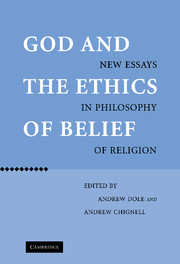Book contents
- Frontmatter
- Contents
- List of Contributors
- Acknowledgments
- The Ethics of Religious Belief: A Recent History
- PART ONE METAPHYSICS: GOD AND CREATURES
- 1 Can God Break the Laws?
- 2 Sleeping Beauty and the Afterlife
- 3 Free Will, Evil, and Divine Providence
- 4 Two Cheers for Mystery!
- PART TWO EPISTEMOLOGY: GOD AND THE ETHICS OF BELIEF
- PART THREE SOCIAL-POLITICAL PHILOSOPHY: GOD, ETHICS, AND BELIEF
- Index
3 - Free Will, Evil, and Divine Providence
Published online by Cambridge University Press: 25 July 2009
- Frontmatter
- Contents
- List of Contributors
- Acknowledgments
- The Ethics of Religious Belief: A Recent History
- PART ONE METAPHYSICS: GOD AND CREATURES
- 1 Can God Break the Laws?
- 2 Sleeping Beauty and the Afterlife
- 3 Free Will, Evil, and Divine Providence
- 4 Two Cheers for Mystery!
- PART TWO EPISTEMOLOGY: GOD AND THE ETHICS OF BELIEF
- PART THREE SOCIAL-POLITICAL PHILOSOPHY: GOD, ETHICS, AND BELIEF
- Index
Summary
Traditional theists in our environment, and christians in particular, tend to endorse libertarianism about free will, according to which we have the free will required for moral responsibility, free will of this sort is incompatible with determinism, and determinism is false. Divine determinism is nonetheless well represented in the history of traditional theism – and by “divine determinism” I mean to specify the position that God is the sufficient active cause of everything in creation, whether directly or by way of secondary causes such as human agents. This position is either obviously or arguably held by Augustine, Luther, Calvin, Descartes, Spinoza, Leibniz, and Schleiermacher, among others. Yet despite the historical prominence of this view, there is an obvious and compelling reason for rejecting it. The consequence that God is the sufficient active cause of all the evils that occur threatens to make divine determinism unconscionable from the very outset. Now if an available alternative were the position that we have libertarian free will, that God is not omnipotent, and that there are evil forces in the universe, other than mere willings, against which God needs to struggle, then one can see why rejecting the determinist perspective would seem attractive. Yet even if this Zoroastrian alternative remains the de facto position of some, it is outside the bounds of traditional Christian, Jewish, and Islamic orthodoxy.
- Type
- Chapter
- Information
- God and the Ethics of BeliefNew Essays in Philosophy of Religion, pp. 77 - 98Publisher: Cambridge University PressPrint publication year: 2005
- 12
- Cited by



